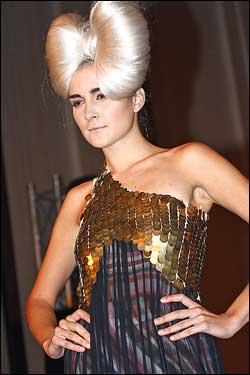
In the old days, our mothers used to recycle their clothes, saving up the precious fabric for a second life as new clothes, pillow cases and floor mats, for example. This art slowly died a quiet death with the advent of cheaper fashion and deeper shopper pockets.
Now, however, the concept of remaking fashion is getting hip again, thanks to both the ever-popular green cause and the financial crisis, which is making shoppers think twice before buying new.
In London, the recently launched Oxfam Boutiques jump-started the trend with a range called Reinvented, comprising of one-off clothing created exclusively for the upmarket charity shops by London College of Fashion students and graduates and independent designers such as Junky Styling.
The designers pick out garments and textiles from donated items that do not sell in the normal Oxfam shops and restyle them into trendy pieces. Vintage fashionistas know to look out for the London College of Fashion Jumble label.
Christina Dean of online eco-shop green2greener.com says: "Redesigning is going to become more popular out of necessity because people will have less money to spend on new items."
One of the website's best-sellers is the G2G tote made from tablecloths from the Hong Kong Ritz-Carlton. "We went to the auction when the hotel was closing and looked at bedspreads, curtains and tablecloths to refashion. We chose the tablecloths because they were made of the most luxurious fabrics."
Retailing at HK$1,500 (w
The company also organizes fashion shows featuring eco-friendly designs. The most recent one featured a haute couture gown - made from an Alexander McQueen copper sequin tank top, a geometric print Monique L'Huillier halter dress and a delicate Alberta Ferretti silk chiffon sheath - by Hong Kong designer Barney Cheng and a dress from vintage saris by Arrogant Cat.
Dean noticed more designers are willing to use recycled textiles these days. "They're looking for inexpensive ways to provide high glamour that is credit conscious. With the recent credit crunch, very inexpensive fabrics combined with high couture is a business win for both designers and customers."
Homegrown designer Prudence Mak is also starting a revolution of her own with an offshoot of her popular Chocolate Rain brand, D.I.Why. Inspired by her master's project for Central Saint Martin's College of Art and Design in London this year, she has created toys, mobiles and accessories using recycled clothing and exhibited them in both London and Hong Kong. The fine arts graduate explains her inspiration: "My professor wanted me to use my craft and art skill to do something with social responsibility. I read up on eco-design and realized that the area had room for improvement.
"During Hong Kong Fashion Week, I handed out questionnaires to more than 50 factory designers and designers and was shocked by the results.
"Less than 6 percent knew anything about eco-design or ethical production. The rest were just concerned about commercial success."
She is also planning a series of workshops on how to recycle clothing into wearable art.
The two-hour workshop will use either fabrics donated from local studios as overstocks or trash or old clothes that the students bring in. The end products will range from accessories to dolls, cushions and deconstructed T-shirts.
Another young brand dedicated to using recycled textiles is Dialog, started by Dutch-born and Singapore-raised Cassandra Postema and Malaysian Dong Shing Chiu. The brand's signature is a recycling technique from Malaysia that incorporates small origami folded squares of mixed fabrics.
Dialog works with charities within local communities such as drug rehabilitation centers, women empowerment initiatives, orphanages and community-development projects. The bags with the distinctive four-fold origami trim are available online or from Fang Fong boutique in Hong Kong.





